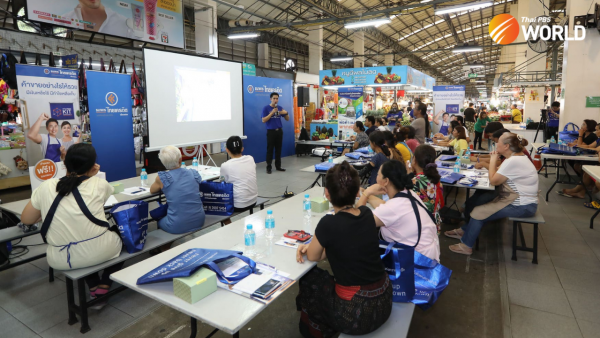Covid-19 pandemic highlights the importance of financial literacy

Financial misery has engulfed both individuals and small businesses as a result of the economic fallout from the coronavirus pandemic and the lockdowns and restrictions that have accompanied it. SMEs, which are the primary source of employment and the key suppliers of goods and services to a large segment of the population, have been the hardest hit. Mom and pop stores as well as informal employment and self-employment in micro-enterprises have been severely affected by the government’s repeated orders to shut in a bid to curb the spread of the novel coronavirus.
To help entrepreneurs and merchants combat the repercussions of this unprecedented health and economic crisis, the government, state agencies, and banks have launched relief programs aimed at those in need.
The Thai Credit Retail Bank (TCRB) has also stepped up to help micro SMEs, the most underserved segment. In addition to a financial relief package, the bank’s Tang To Know-how (Make Money, Save Money, Invest Money) program designed to improve financial literacy can help them manage the financial uncertainty and stress brought on by the Covid-19 outbreak.
Jakkrit Manalor, 26, owner of a furniture outlet located near The Mall Thapra says the online financial tools the TCRB provides have enabled him to take control of his finances and manage his financial stress in lean times. His outlet mainly supplies furniture and provides maintenance and repair services to hotels, part of the hospitality sector that has been hit particularly hard by the pandemic.
“This is one of the most stressful times for me. My business has taken a hit and so have my finances. I’ve had to make tough financial decisions. I follow experts’ instructions in the VDOs, keeping my personal and business finances separate. I’ve learned to set aside budgets for what I actually need and what I want. So, I can see where I can save. I didn’t know that knowledge could really help solve my money headaches. I’m more at ease even in the face of reduced orders and services during the pandemic,” Jakkrit says.
Nuttapavee Siritanon, 50, owns a clothing and gift shop located near Huachiew Chalermprakiet University in Samut Prakarn’s Bangplee district. Her shop has been adversely affected and her sales have fallen 80 percent since the onset of the pandemic as workers and university students, her main customers, have been urged to work from home and take online classes.
The entrepreneur says the training program has enabled her to better understand the importance of customer satisfaction and shifts in their behaviors resulting from the crisis. She is now able to provide experiences and services that meet their new needs with empathy, care, and concern. She attended a session held in a hotel in Bangkok’s Ladkrabang district.
“It made me rethink what customer care means. Now our clients need digital, at-home, and low-touch options. So, we’ve increased Facebook engagement and used Line to connect with them. We also provide delivery services. I sometimes drive to customers’ homes to give them the products they have ordered. We believe this can help us all navigate the pandemic safely and effectively,” Nuttapavee says.

Meanwhile, Supattra Teekayu, 44, who has taken the online classes offered by the bank says record-keeping allows her to closely monitor her grocery store and drink kiosk on Sri Ayutthaya Road.
“I’ve been keeping separate records of my personal and business finances for about three months. Records tell me if my business is improving, which items are selling or what changes I need to make. Now, I’m able to revise my budget to deal with a reduction in my monthly income. I think I might have enough money to save, even it’s just a small amount, after I pay back my loan to the bank,” she says.
Sales of her drink outlet have declined since the government imposed measures on dining in, making it impossible for her to serve a range of drinks to those eating at various food outlets near her kiosk.
Supattra says she has set achievable savings goals following experts’ recommendations.
“It’s a good idea to hold on to some of my income for a rainy day. So, I can relax knowing there’s enough. Having a goal lets me know how close I’m to finishing. Making a plan lets me know I will finish. I’m getting more comfortable managing my money.” she says.
Why financial literacy is so important for micro SMEs
TCRB managing director Roy Agustinus Gunara says all businesses face hardships, challenges, shortages, and also natural disasters. It’s all about business risk management and that requires education if failure or bankruptcy is to be avoided.
“Our program is comprehensive in helping our small business customers to manage their risks and survive ups and downs. During the pandemic, businesses need to learn how to manage costs, savings, improve cash flow and understand safety and survival,” Gunara says.
The need for greater financial awareness among entrepreneurs has never been more apparent than during this health crisis as many find themselves in financial difficulties and unable to cover expenses without income, according to a recent survey jointly conducted by TCRB and the University of the Thai Chamber of Commerce (UTCC)’s School of Accountancy of 1,669 entrepreneurs and merchants across the country.
The findings showed that over 77 percent of survey respondents are at risk of failing to handle unexpected financial emergencies. They are unlikely to be able to survive three months without generating income.
Income loss among florists and those who make garlands for sale is a particularly worrying situation. Over 40 percent of them in this business would not be able to survive more than one week if they are not able to work.
Thai banks offer 2-month debt moratorium for SMEs hit by semi-lockdown
Small and medium-sized businesses in areas of Thailand under semi-lockdown and control measures will be granted a debt and interest moratorium for July and August, as part of a new financial rescue package jointly worked out by the Bank of Thailand, the Thai Bankers’ Association and the Foreign Banks Association.
Always standing beside micro SMEs
Tang To Know-how financial literacy training program was created to support the micro SME segment that is usually ignored by leading financial institutes and banks who prefer less risky customers. In addition to helping them grow sustainable businesses, it is also aimed at boosting financial awareness and discipline, enabling them to handle money issues in the right way and achieve a lifestyle that is financially balanced, sustainable, and responsible, regardless of circumstances.
“Our bank has a core belief that ‘Everyone Matters’. We feel the pain of this segment and try to create solutions that help them improve the financial aspects of their lives so that they can become stronger and independent,” Gunara says.
The curriculum has been designed by TCRB and certified by the UTCC’s School of Accountancy. Offering both in-person and online platforms, it is a guide to a successful entrepreneurial journey that covers different aspects from knowing customers to setting strategic goals and from money management to digital tools to boost sales.
It also incorporates expense management, prioritizing expenses, bookkeeping management, insurance management, debt management prioritization, digital banking, and expanding channels of sales, especially online. The program’s highlight is personal finance involving financial planning for different stages of life, from mid-career to pre-retirement and from early to later retirement. Online tools for virtual learning come in a series of animated VDOs that help simplify some of the difficult topics and keep learners’ attention.
The program content was specially created to cater to the exact needs of participants. It’s consistent with the findings of a financial literacy survey conducted by the bank.
“Our Financial Literacy program is not too theory-based, but geared to practical matters, so it provides maximum benefits for our customer segment in their daily lives,” Gunara says.
The training program is now expanding to cover community-based enterprises and OTOP entrepreneurs in provinces that have also been affected by the economic impacts of the outbreak, with support from the Community Development Department, under the supervision of the Ministry of Interior.
“For the Thai Credit Retail Bank, it’s not about breadth; it’s about depth. We will indeed grow the financial literacy program but more than simply scaling up and trying to spread our reach, we want to do whatever we can to ensure that the customers and non-customers who go through the program ultimately become more empowered using our banking solutions to become financially smarter and more self-reliant.
“Rather than being a crutch, we want to be an enabler for micro SME to grow their businesses. We want to see a better and thriving community of micro SMEs in Thailand,” says Gunara.






